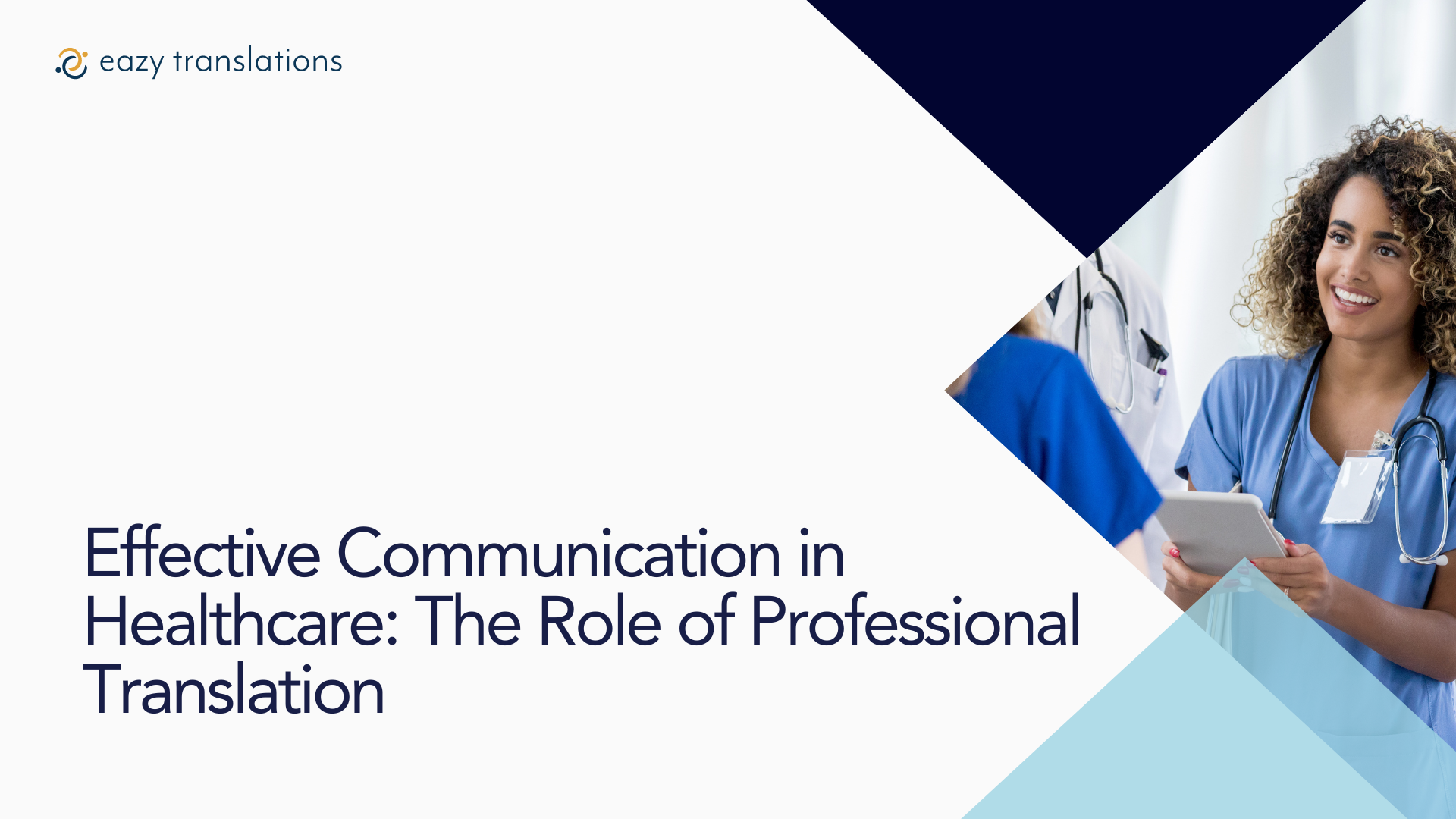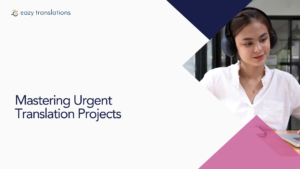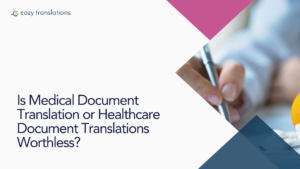Effective communication within healthcare is not only crucial but paramount for ensuring the highest quality of patient care, safety, and overall satisfaction. In today’s globalised world, where patients and healthcare providers often come from diverse linguistic backgrounds, the role of professional translation services becomes even more critically important.
For example, professional translation services play a vital role in bridging the language barrier and ensuring that critical information, such as medical histories, treatment plans, and medication instructions are accurately conveyed between patients and healthcare professionals.
Let’s take a closer look at the vital relationship between professional translation services and the healthcare industry.
Contents
The Importance of Effective Communication in Healthcare
Patient Safety and Care
Clear and effective communication is of utmost importance in the field of healthcare. It plays a vital role in ensuring accurate diagnosis, comprehensive treatment planning, and exceptional patient care. Avoiding any misunderstandings or miscommunications is crucial, as they can have serious consequences such as incorrect diagnoses, inappropriate treatments, or even medical errors. By prioritising clear communication, healthcare professionals can safeguard patient safety and promote optimal outcomes.
Informed Consent and Patient Autonomy
Patients have the right to fully understand their health condition, treatment options, and the risks involved. Effective communication is crucial for ensuring informed consent, respecting patient autonomy, and legal compliance. Informed consent is a fundamental ethical principle in healthcare, and it ensures that patients are actively involved in their care decisions and have all the necessary information to make informed choices.
Patient Satisfaction and Trust
Exceptional communication between patients and healthcare providers also directly impacts patient satisfaction and trust. When patients feel heard, understood, and well-informed about their health, they are more likely to trust their healthcare team and have a positive experience. This leads to higher patient satisfaction rates, improved health outcomes, and better overall quality of care.
Challenges in Multilingual Healthcare Settings
Language Barriers
In multilingual settings, language barriers can impede effective communication between healthcare providers and patients who do not speak the same language. This can lead to misunderstandings, patient dissatisfaction, and even medical errors as discussed. Healthcare professionals must be sensitive to the needs of patients who do not speak the same language and find ways to overcome these barriers, such as using certified medical interpreters or professional translation services.
Cultural Differences
Another challenge in multilingual healthcare settings is understanding and navigating cultural differences. Patients from different cultures may have different beliefs, values, and expectations regarding health and treatment. Healthcare providers must be aware of these differences and adapt their communication and care accordingly to provide culturally competent care.
Health Disparities
Multilingual healthcare settings can also contribute to health disparities among different linguistic groups. Patients who do not speak the primary language may face challenges in accessing quality healthcare services, leading to poorer health outcomes and increased health inequalities. Healthcare providers must work towards addressing these disparities by providing equitable care for all patients, regardless of their language or cultural background.
The Role of Professional Translation
Accurate and Clear Translation of Medical Documents
Professional translators ensure that medical documents such as patient records, consent forms, and informational brochures are accurately translated. This is vital for maintaining continuity of care and legal compliance. Translators must be proficient in both languages and have specialised knowledge of medical terminology to accurately translate these documents.
Interpreting Services for Patient-Provider Communication
Professional interpreters play a crucial role in facilitating real-time communication between patients and healthcare providers. They help overcome language barriers during consultations, examinations, and treatment discussions. Interpreters must also be aware of cultural nuances and ensure accurate and culturally appropriate communication between patient and provider.
Cultural Competence and Sensitivity
Professional translators and interpreters specialise in cultural competence. They can navigate cultural nuances and ensure that communication is not only linguistically accurate but also culturally appropriate. This is crucial in healthcare settings, as cultural differences can impact patient-provider trust and have a significant influence on treatment outcomes.
Ensuring Confidentiality and Compliance in Healthcare Settings
These services play a crucial role in maintaining strict confidentiality and privacy standards, particularly in the healthcare industry. These services go above and beyond to ensure compliance with healthcare regulations and standards, such as the Health Insurance Portability and Accountability Act (HIPAA) in the United States. With their extensive expertise and specialised knowledge, professional translators guarantee that sensitive medical information remains secure and protected throughout the translation process, providing peace of mind to healthcare providers and patients alike.
Specialised Knowledge and Terminology
Medical translation requires highly specialised knowledge of healthcare terminology, medical practices, and the intricacies of different medical fields. Professional translators with expertise in medical translation possess a deep understanding of complex medical terms, concepts, and procedures, ensuring accurate and precise translations.
Impact of Technology in Healthcare Translation
Translation Technology Tools
In today’s modern world, advancements in translation technology have greatly revolutionised the way we approach language barriers. With the introduction of machine translation and computer-assisted translation (CAT) tools, the process of translating content has become faster and more efficient. These tools leverage the power of artificial intelligence and algorithms to provide quick and automated translations.
However, it is important to note that while these technologies have made significant progress, the final output often requires the expert touch and human input of a professional translator. Their expertise ensures the accuracy, nuance, and cultural relevance of the translated content, guaranteeing a high-quality result that perfectly resonates with the target audience. So, while translation technology tools are invaluable aids, the human touch of a skilled translator remains indispensable in delivering flawless and contextually appropriate translations.
Telemedicine and Remote Interpreting Services
Within particular areas such as telemedicine, the demand for remote interpreting services has grown exponentially. These services play a crucial role in bridging language gaps and ensuring effective communication between healthcare providers and patients during virtual consultations.
By leveraging advanced technology and qualified interpreters, remote interpreting services enable accurate and seamless interpretation, facilitating access to quality healthcare for diverse populations regardless of language barriers. This innovative approach has transformed the way healthcare is delivered, making it more inclusive, efficient, and patient-centred.
Final Thoughts
Effective communication is not only a cornerstone but a fundamental pillar of quality healthcare. The ability to accurately convey information and understand patients’ needs is paramount in ensuring optimal care. Professional translation services play a vital role in multilingual healthcare settings by bridging language barriers and facilitating seamless communication between healthcare providers and patients.
By leveraging professional translation services, healthcare professionals can ensure that medical information is accurately and clearly conveyed in patients’ native languages. This not only promotes patient safety but also enhances informed consent, as patients can fully comprehend the risks, benefits, and alternatives of medical procedures or treatments.
As the healthcare industry continues to evolve and diversify, the demand for professional translation and interpreting services is projected to grow exponentially. This highlights their crucial importance in global health contexts, where effective communication can quite literally mean the difference between life and death.





